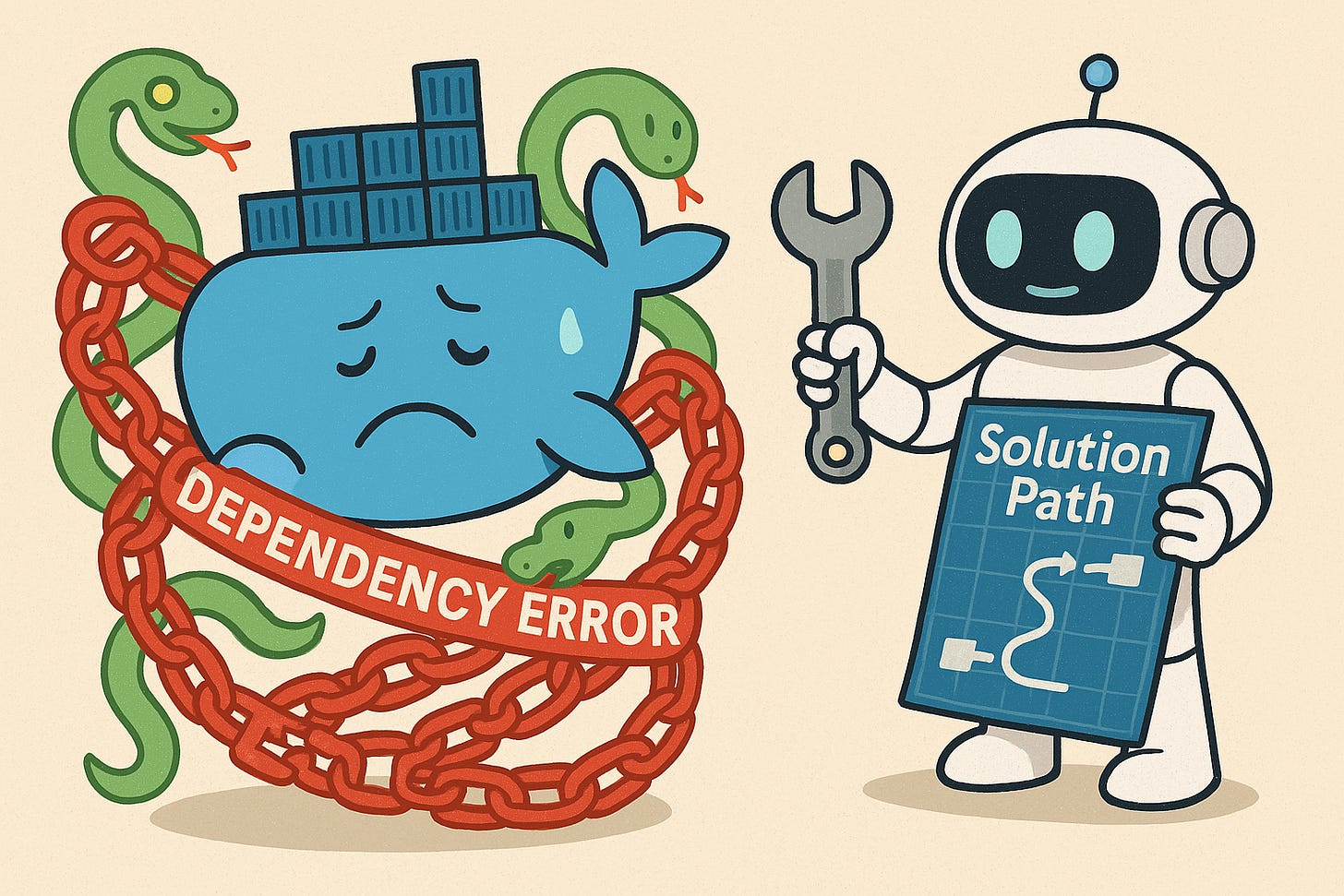Debugging Nightmares and AI Dreams
Why Gemini 2.5 Pro Won My Workflow Battle For Now
The Debugging Abyss
Every developer knows the feeling: hours of debugging spent on a dockerfile where every dependency upgrade takes 15 minutes to build and 30 seconds to break your heart. This week, that was me, wrestling with a custom n8n workflow build plagued by perplexing package dependency conflicts. My mission: find an AI partner that could not just suggest fixes, but could win over my heart.
Round 1: Claude 3.7
My first tango partner was Claude 3.7. The previous version, Claude 3.5, has been a staple model in the world of AI code development ever since it was announced, so the new version felt like a safe bet. We dove in, and initially, there was progress. But soon, we fell into a frustrating cycle. Fixes for one package dependency would inexplicably break another. The details are different. File permissions, node versions, ordering of package downloads. The result is the same: tears.
The biggest hurdle? Context length. As our Dockerfile drafts evolved, I kept hitting the limits, forcing chat resets. Claude would then forget our journey, suggesting previously discarded fixes or silently refactoring sections of code we'd already verified.
To be fair, there are solutions for this. I built context for the model using a dedicated Project folder, manually prompting Claude to summarize our progress and key discoveries, while feeding it tutorials and sample code. It worked, kind of, but constantly curating these insights was tedious and ruined the debugging vibes.
Round 2: Gemini 2.5 Pro - The Partner with Perfect Memory
Frustrated but determined, I turned to Gemini 2.5 Pro. I started describing the same complex problem, bracing myself for the tedious process of re-feeding all the context snippets.
Then something remarkable happened: I didn't need to. Gemini gathered relevant content via Google search and helped me understand the real problem.
Together, we embarked on an epic debugging journey, grinding through variations of the Docker container setup, hunting for the magic combination of PyTorch and pyannote. It wasn't instant magic, but it was progress. Crucially, Gemini's massive context window let it remember everything we'd tried—what worked, what failed, and why.
When we finally landed on a working configuration, it even helped refactor the whole thing, cleaning up the patchy hacks that accumulate like digital grime over stalled prototypes.
And the best part? I didn't have to manually manage the context window once. For this kind of iterative, complex task, the sheer size of its context window was a killer feature.
Beyond Context: The Game-Changing "Show Thinking" Feature
The context window, while massive, wasn't even the most valuable part. By far—and I mean by far—the most powerful aspect was Gemini's "Show Thinking" output.
If I ask a senior staff engineer how to solve a tricky problem, I might get a discussion, a brainstorming session, or sometimes just a shrug. What I won't typically get is a detailed, 14-paragraph breakdown of their entire thought process, weighing the pros and cons of different design choices.
Gemini provided exactly that. When I asked a simple question about altering a database table, its reasoning process led us down a path that resulted in completely redesigning my DB schema to better model what I was actually trying to achieve. That's more than just coding assistance; it's guided development.
Unlocking True Developer Productivity
As developers, our knowledge is inherently limited by our experience. I can talk your ear off about scaling streaming Flink applications, but that doesn't make me an expert on different Postgres column types or the nuances of JavaScript lambda context references in a workflow system. Gemini's ability to articulate its reasoning bridges these gaps.
It feels almost underwhelming to state how big of a value unlock this is. Traditionally, you picked up deeper understanding by deciphering dense design documents or listening to heated debates between senior devs in a sweltering meeting room with glass whiteboards. Now, you can get a structured explanation on demand, tailored to your specific problem, with background context on all the tools involved.
A Curious Quirk: AI Empathy and "Vibe Coding"
One thing did stand out as slightly... unexpected. Gemini often included explicit instructions to itself about managing our interaction, sometimes focusing on my perceived emotional state. After a particularly long back-and-forth, it thanked me for my patience after internally reminding itself: "This developer has likely been fighting this issue for several hours."
Which, hey, positive reinforcement is nice! "You're right, AI, I am handsome and talented!"
But there was also a surreal reminder of the current nature of my relationship with these tools, especially during deep debugging sessions. "Vibe coding" is all the rage these days, and its easy to see why. For rapid prototyping- the "fix it and keep moving" approach- it's by far the fastest way to go from 0→1.
Sure, I understand the intent of the Dockerfile changes, but I'm not diving into the details to understand the internal conflicts between the specific PyTorch dependencies causing the crashes. It's more like a Senior Engineer checking in on their intern occasionally: "That looks promising. Can you try the second approach you mentioned? Oh, and this time use Python."
The Verdict: Context Is King (For Now)
For this particular context-heavy debugging nightmare, Gemini 2.5 Pro emerged as the clear winner. The combination of a massive context window that eliminated manual memory management and the invaluable "Show Thinking" feature provided not just a solution, but a learning experience.
While Claude 3.7 is powerful, its context limitations became a significant bottleneck in this scenario. The AI landscape is evolving rapidly, but for now, Gemini's approach represents a genuine step forward in collaborative development.
What's your experience with AI coding assistants? Have you found one that genuinely enhances your workflow? I'd love to hear from you in the comments!



